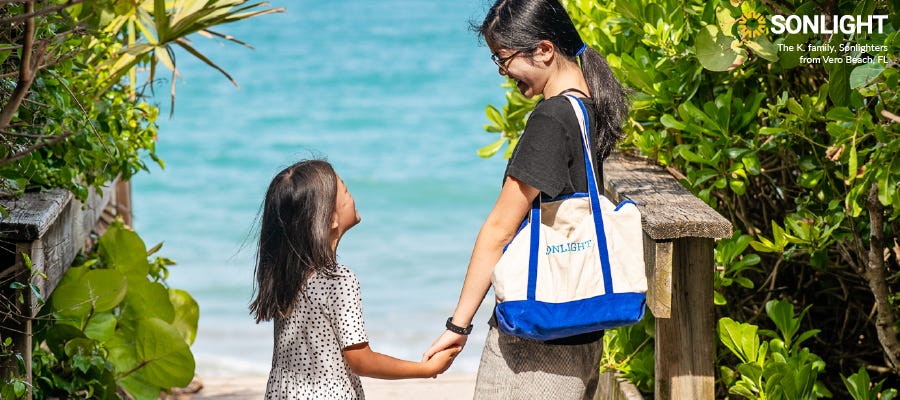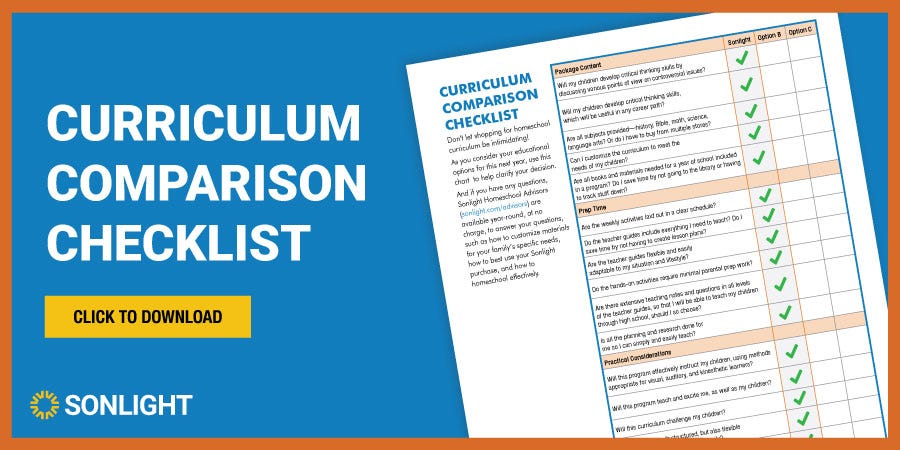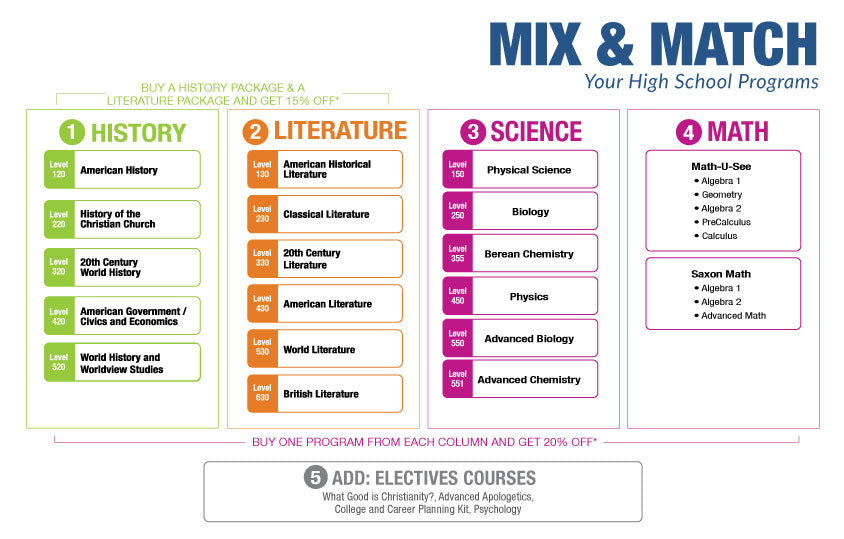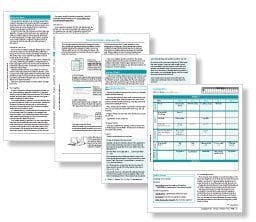Homeschooling in Florida: Guidance for Getting Started
Looking for Florida homeschooling information? Maybe you know you want to homeschool and are ready to find out what steps you need to take to get started. Or maybe you’re just curious about homeschooling and want to dabble in the basics of homeschooling in Florida: what you’ll need to homeschool, how much it costs to homeschool in Florida, and what the Florida homeschool laws require. This guide was written for you!

DISCLAIMER: This article is not written as legal advice. Check with your local school board and official Florida laws before making decisions about educating your children.

K. Family, Sonlighters from Vero Beach, FL
Requirements for Homeschooling in Florida
Florida homeschooling statues outline three ways to homeschool in the state:
- Under the homeschool statute (the most common method).
- Via an umbrella school (a private school that provides support to you while you school your children at home).
- Through the teaching of a private (certified) tutor.
This guide will primarily focus on the first type of homeschooler, but occasionally will reference the other two methods.
The rules for homeschooling in Florida are clear and allow for a large measure of freedom. Homeschooling is totally doable in Florida!
Unless you hire a certified tutor to homeschool your child (option 3 above), you don’t need to worry about Florida homeschooling hour or day requirements. There are none! You don’t have to keep attendance records or log a certain number of days or hours of instruction.
You may be surprised to learn how efficient homeschooling is! Your school days at home will take a fraction of the length of a typical school day. Watch this video to learn why:
No, if you are teaching your own children, you do not have to be certified. (If you hire a tutor to teach your children, however, that teacher does have to be certified in the state of FL.)
No, there are no parental qualifications to homeschool. You don’t need any certain level of education or any type of licensure or certification to teach your own children.
If you don’t feel qualified to teach and long for direction and support, you may want the reassurance of an umbrella school. Read Lupe Tucker’s excellent dissection of the pros and cons of going this route. There are trade-offs. Along with the support come additional requirements and limitations. Some parents appreciate more structure and oversight (such as an umbrella school offers) while others prefer total freedom (by operating as an independent homeschooler).
Any parent who is willing to adhere to the FL requirements is eligible to homeschool.
You do need to report homeschooling in Florida by filing a letter of intent for homeschooling in Florida. FLDOE Home Education Affidavit and provides a form to download. You can also get a free Letter of Intent Template from Florida Parent Educators Association (FPEA).
If you’re switching from public school to homeschooling in Florida, be sure to first officially withdraw your child from school so there are no concerns about truancy.
Yes! Unschooling is perfectly legal in Florida. The state makes no requirements in terms of materials or methods used, so if you want to take the student-led unschooling approach, you are free to do so.
Yes, Florida Statute 1002.43 has a provision for parents to hire a private tutor to educate their children. In this case, the tutor must hold a valid Florida certificate to teach the subjects or grades in which instruction is given. This tutor is responsible to keep records (including attendance) and report to the district school board. With a private tutor, instructional time must match what is required of public school students—180 days per school year.

The R. Family, Sonlighters from Seminole, FL
What are homeschool requirements in Florida?
Florida homeschooling requirements are minimal:
1 File a letter of intent to your school district.
2 Maintain a portfolio (and keep it for at least 2 years).
3 Evaluate your child annually and submit this evaluation to the school district.
That’s it! Reach out to your local district for assistance and how to submit your required paperwork. The FLDOE lists a homeschool liaison for each district.
What proof is required for homeschooling in Florida?
Your portfolio and your annual evaluation are the two key forms of proof or documentation that you’ll need to supply each year.
Here’s the official Florida definition of a portfolio:
"A log of educational activities which is made contemporaneously with the instruction and which designates by title any reading materials used and samples of any writings, worksheets, workbooks, or creative materials used or developed by the student.”
Throughout your school year, keep documentation of what you covered with your child. You don’t need an elaborate filing system or a fancy presentation medium. Keep these things: A list of what curriculum and learning resources you used. A log of field trips, homeschool co-op classes, and other extracurriculars. Student samples of work (either physical or digital copies)—a few from each the beginning of the year, possibly from the middle of the year, and definitely from the end of the school year so that the evaluator can see progress.
Be assured that the portfolio is merely used to demonstrate progress. There is no requirement that your child be on grade level as per Florida standards. If your child has matured from point A to point B, that’s progress!
Be sure to keep your portfolio for at least two years. Although your school district is not required to look at your portfolio, the superintendent could possibly ask to see it upon a 15-day written notice. This situation is rare but is legally possible.
There are five ways to fulfill the requirement of an annual evaluation:
1. A Florida certified teacher may evaluate the child's progress based on a portfolio review and meeting with the child.
2. The student may take a nationally normed student achievement test administered by a certified teacher.
3. The student may take the state assessment provided by the school district.
4. The student may be evaluated by a credentialed psychologist.
5. The student may be evaluated with any other valid measurement tool as mutually agreed upon by the parent and the superintendent.
Having a certified teacher go over your child’s portfolio is the most common method of annual evaluation. This is simple, low-key, and affordable. The assessor is simply looking for progress from the beginning of the year to the end. Here’s how one evaluator describes what she looks for during one of these assessments:
"Florida law requires evidence of educational progress commensurate with ability. Educational progress could be shown by finishing 2/3 or more of a curriculum (Schools almost never finish theirs so they can't require us to finish ours.), or less if supplemented with a lot of materials or activities outside the main curriculum. Or by earning passing grades in a curriculum that provides grades. Or by showing that the student is working on more advanced materials or has more advanced skills than at the beginning of the year. Or by showing that the student has been regularly learning in a variety of subject areas.”
If your child is regularly learning and you've kept records of that learning, passing the evaluation should not be a worry.
FPEA offers a directory of possible evaluators. Or you can find a teacher on your own to do it. Any certified teacher can do the evaluation.

The K. Family, Sonlighters from Pensacola, FL
Is it easy to homeschool in Florida?
Great news! Florida has quite a few school choice options, and it’s easy to homeschool in Florida.
Lisa F., a Sonlighter in Jacksonville, FL says
We have a lobbyist in Tallahassee who advocates for our right to school with minimal interference.” That lobbyist has obviously been successful. As per theHome School Legal Defense Association, Florida is a low-regulation state. So at least in terms of the state-mandated requirements, you’ll find homeschooling fairly easy in the Sunshine State.
There are a few minimal requirements outlined below, but nothing onerous. The ease of homeschooling in Florida (plus all the amazing field trip opportunities) makes homeschooling a popular choice. For example, as per FLDOE Sept. 2022 Fact Sheet,
For the 2021-22 school year, the numbers provided by the districts indicated that 104,961 families and 152,109 students participated in home education programs.
See more homeschooling in Florida stats from the state Department of Education here. Their annual report shows a graph of the homeschool numbers over time and also lists the number of homeschooled children and families by district.
Do you have to have a curriculum when homeschooling in Florida?
As a homeschooler, you are required to provide educational experiences for your child that develop them intellectually and academically. The statue uses the phrase “sequentially progressive instruction.” But you can choose how you do that.
FPEA says, “Florida does not require any specific curricula or even specific credits for high school; you are free to select the materials and the courses best suited for your children.”
So the technical answer is no. In Florida you aren’t required to have a curriculum. There’s no question about your curriculum on your letter of intent. The homeschool statutes don’t outline any particular requirements in terms of subjects, courses, methods, or curriculum. But the state does look for educational progress commensurate with ability in your annual evaluation.
A curriculum is truly the simplest, most direct way to achieve those goals. Of course, you can branch beyond your curriculum to add supplements, excursions, extracurricular activities, etc. But a curriculum gives you peace of mind that you’re covering the basics. And it also gives you a foundation for anchoring all the extras you’ll want to tack on as you design a robust education for your child.
Sonlight makes choosing, and customizing, your curriculum easy with flexible All-Subjects Packages. Watch these videos for an introduction, and then reach out to an Advisor for personalized help with designing your ideal program. (Their services are totally free.)
You don’t need any teaching experience or even a college degree to homeschool successfully with Sonlight. It’s laid out for you with timesaving tools that make teaching truly open-and-go. And, best of all, Sonlight uses a literature-based approach that is incredibly enjoyable!
Do homeschoolers have to take standardized tests in Florida?
In short, no, homeschoolers do not have to take standardized tests in Florida. However, you may opt for a standardized test as your method for annual evaluation.
If you do choose a standardized test as your evaluation method, the school district is required to provide the state assessment to you. But you can also opt for another nationally norm-referenced test (and pay for it yourself). See the complete list of approved assessments here.
(If you’re homeschooling under an umbrella school, that private school may have requirements related to standardized testing. Inquire of the school to find out.)

The S. Family, Sonlighters from Jacksonville, FL
Getting Starting & Timing
Now that you know how homeschooling works in Florida, let’s drill down to the specifics—exactly how to get started, what you’ll need, when to start, and how long to homeschool.
At what age is school mandatory in Florida?
Compulsory school attendance is required for students ages 6-16. To be more specific, if a child will be 6 by Feb. 1 of any school year, the child must attend school (or be homeschooled) for that entire school year.
Can you skip kindergarten in Florida?
In Florida, kindergarten is optional for both public schoolers and for homeschoolers. So, yes, you can skip kindergarten.
But be aware of a big caveat. If your child skips kindergarten and attends public school for first grade at age 6, the district may place your child in a kindergarten class even if you completed an at-home kindergarten program. Reach out to your district for specific policies.
To homeschool before first grade, choose from these three early years programs from Sonlight:
How do I start homeschooling in Florida?
Ready to start homeschooling in Florida? Your first step is to notify your school district by filing an intent to home educate within 30 days of beginning to homeschool.
Once that legal requirement is out of the way, you’ll want to do some introspection about your homeschool preferences. Your answers to these questions will inform your decisions about materials, techniques, and more.
1 What style of learning suits you and your child?
2 What kind of curriculum will be best for you?
3 What are your goals for homeschooling?
If you’re coming from the public school system, take some time to change your thinking around school. This video is a thought provoking starting point:
What do I need to homeschool my child in Florida?
Because all of life is learning, you need surprisingly little to homeschool in Florida. The heart of a lifelong learner—and your library card—will take you far! At a minimum, your necessities fall into these three categories:
1. A Homeschool Curriculum
Based on your homeschool philosophy, your child’s learning preferences, and your own goals, narrow your curriculum choices. Here’s a curriculum comparison checklist to help you in this process.
Before you make your purchase, consider these questions:
- Can this curriculum be used with multiple children simultaneously?
- Does this curriculum build a vibrant home library? Or is it filled with consumables I’ll discard at the end of the year?
- Does this curriculum offer a payment plan and a guarantee?

2. Homeschool Spaces
While you don’t need a dedicated homeschool room to be successful, you will probably want a few designated areas: shelves and cupboards for supplies, a cozy spot for read-alouds, and an area for pencil-and-paper table work.
3. A Homeschool Schedule (or Routine)
To make sure you give your child adequate instruction, you’ll want to adhere to a flexible schedule or routine. If you get a curriculum like Sonlight, the Instructor’s Guide can serve as your daily schedule.
Lots of homeschool moms use a planner like this one to organize their days—both their homeschool objectives as well as their household and personal responsibilities.
How long can you homeschool a child in Florida?
You can homeschool from preschool through high school graduation or any set of years therein.
Some families homeschool only for a year or two because of a life event such as an illness or a global pandemic. When the motivating situation is resolved, they return to public school (or decide homeschooling is so great that they keep going).
Other families take the choice to homeschool year by year, re-evaluating their decision each summer before committing again. And still other families are sold-out homeschoolers who know from the start that they’ll never choose any other educational method except homeschooling.
Whether you’re a lifer, a short timer or uncertain about how long you’ll homeschool, Sonlight is a solid curriculum choice. You can jump in at any time with a program—preschool, kindergarten, elementary years, middle school, or even high school. Consult with an Advisor to get relevant advice for your specific situation.
If you do stop homeschooling before your child’s high school graduation, you are obligated by Florida homeschool laws to inform your school district by filing a letter of termination within 30 days of closing your home education program. Even if you’re still homeschooling but have moved out of Florida (or to a new county in the state), inform your school district to terminate your status.
Must-see Florida Field Trips for Homeschoolers
Keep track of your Florida field trips for your required portfolio with our free printable field trip log—an excerpt from the Sonlight homeschool planner. Print as many pages as you need. And you may need a lot! Florida has so many amazing field trip possibilities.
Homeschool Field Trip Bargains
Florida venues love having homeschoolers for field trips! That’s why many of them have special homeschool days or offer special homeschool discounts. Inquire of the venue to verify that the discounts listed below are still available since policies can change.
- SeaWorld and Busch Gardens both offer free preschool cards, granting free admission for children five and under.
- Wonderworks offers deeply discounted admission prices on annual homeschool days.
- The Kennedy Space Center offers discounts on educational tours of 15 or more.
- Orlando Science Center gives a 10% discount to homeschoolers. Just show your FPEA membership or letter of intent to homeschool!
- Museum of Science & Industry (MOSI) grants homeschool parents special pricing via their Educators Circle.
- Cracker Country offers special homeschool tours.
20 Top Field Trip Destinations in Florida
- Tarpon Springs (learn about the Greek sponge divers)
- Fort DeSoto Park
- Air Force Space & Missile Museum
- Venice Area Audubon Society
- St. Augustine’s castles and historic churches
- Manatee habitats and refuges
- The Holocaust Museum & Cohen Education Center
- Osceola County Fair and Livestock Show
- Florida Museum of Natural History
- The Florida Aquarium
- The Raney House Museum
- Historic Pensacola
- Military Heritage Museum
- McKee Botanical Garden
- Cape Canaveral Lighthouse
- Miccosukee Indian Village & Museum
- Crystal River Archaeological State Park | See all Florida State Parks here
- Lubee Bat Conservancy
- American Space Museum & Space Walk of Fame
- Olustee Civil War Battlefield State Park

The G. Family, Sonlighters from Mary Esther, FL
Financial Considerations for Homeschooling in Florida
Homeschooling does have a cost. In most cases, one parent devotes full time attention to teaching the children. Because of the time commitment required, the teaching parent is unlikely to also hold down a full time job. (Many parents do juggle work-from-home side gigs and part time work, though!) So homeschooling can reduce household income in many cases.
On top of the lower earning potential, homeschool families bear the cost of curriculum, afterschool activities, field trips, etc. But the benefits of homeschooling make any financial sacrifice well worth it!
How much does it cost to homeschool in Florida?
Nationwide, the typical annual expense to homeschool one child is $500 to $2500. These costs hold true for Florida homeschoolers, too.
If that seems like a scary number, keep in mind that many families think homeschooling is cheaper than public school when they consider expenses like school uniforms, transportation for drop off and pick up, school lunches, all the various fees, and the long school supply list. And, of course, there’s no way to put a financial value on the time wasted in carline or the frustration spent on homework and often pointless school projects.
When compared to private school tuition, homeschooling is an incredible bargain! According to School Choice Week, “The average tuition for private schools in the state [of Florida] is $9,503 for elementary schools and $10,543 for high schools.” For about a tenth of the cost of private school, you can purchase a top-notch, all-in-one curriculum like Sonlight.
To learn more about the cost of homeschooling in Florida, read the detailed guide How Much Does Homeschooling Cost?
How can I homeschool in Florida for free?
Free homeschooling in Florida is certainly possible if you’re willing to dedicate hours of preparation, pulling together lesson plans, downloading freebies, comparing book lists to find the very best ones, placing book holds at the library, and printing out reams of free printables.
But you have to ask, “How much is my time worth?” (Not to mention all that printer ink!) And maybe even worse is the self-doubt that comes with a DIY approach. While some parents are fully confident in their ability to pull together a comprehensive curriculum, most parents are overwhelmed by the thought and prefer to rely on a tried-and-true program devised by professionals.
So instead of thinking about homeschooling for free, think in terms of getting the absolute best value for your family’s homeschool budget. We all love a bargain, but your child’s education is no place to skimp! Save the freebies for supplements and invest in your children with a high quality curriculum and hands-on learning resources.

DID YOU KNOW?
Family Empowerment Scholarship families can now visit the MyScholarShop to purchase educational materials from Sonlight.
Use your ESA funds to get your entire homeschool year in one easy package! History, math, science, and more—all scheduled and planned out for you. Just open and go!
Can I get money from the state for homeschooling?
The Florida Tax Credit Scholarship (FTC) and the Family Empowerment Scholarship for Educational Options (FES-EO) give your child access to the education that best meets their needs. These scholarships provide financial assistance for private school tuition and related costs, public school transportation, and more.
Is homeschooling a tax write-off?
No, homeschooling is not tax-deductible in Florida.
Do I have to pay school taxes if I homeschool?
Yes, you still have to pay school taxes even if you homeschool. Homeschooling does not reduce your tax liability for any taxes: property, city, county, state or federal.
Partnering with Schools in Florida
Although part-time homeschooling isn’t done in Florida, homeschooling laws in Florida do allow homeschoolers to participate in public school activities. So inquire of your local district to see if activities like band or sports are available to your child.
Christian Homeschooling in Florida
Are you homeschooling out of a longing to pass your faith to the next generation? If so, Christian homeschooling is an excellent option.
Deuteronomy 4:9-10 (NIV):
Only be careful, and watch yourselves closely so that you do not forget the things your eyes have seen or let them fade from your heart as long as you live.Teach them to your children and to their children after them.Remember the day you stood before the Lord your God at Horeb, when he said to me, “Assemble the people before me to hear my words so that they may learn to revere me as long as they live in the land and may teach them to their children.
Many parents consider homeschooling a natural outgrowth of the calling to teach their children the things of God. This mission has been at the very heart of Sonlight since its inception. That’s why every History / Bible / Literature package has the Bible integrated into the program and always includes a missionary biography to inspire your family with stories of sacrifice and godly obedience.
If you want to homeschool with a Christian perspective, Sonlight is the ideal choice.
Finding Homeschool Community in Florida
Because homeschooling is so popular in the Alligator State, it’s fairly easy to find homeschool community in Florida. And let’s be honest. You’re going to need community! Not only can community provide an outlet for field trips and socialization for your child, but it can also offer you the comfort of like minded moms who know exactly what you’re going through. Don’t try to go it alone. Find your homeschool tribe and get the emotional support and practical advice you need!
Here are websites and organizations that can either provide the community you need or direct you to a local group:
- Florida Parent Educators Association
- Black Homeschoolers of Central Florida
- Florida Homeschooling Support Groups
- Search Sonlight Connections for in-person homeschooling group in Florida
Homeschooling High School in Florida
Yes, you can homeschool all the way through twelfth grade and not shortchange your teen one iota of future advantage! In fact, homeschooling provides incredible benefits that a public school simply can’t match. You can customize a 4-year plan that prepares your teen for their future and builds on personal passions and strengths in a way that a cookie-cutter public school education simply can’t.
Sonlight provides flexible mix-and-match homeschool curriculum choices for high schoolers.
Dual enrollment means a high schooler is simultaneously earning both high school credits and college credits by attending college classes. Homeschoolers are eligible for dual enrollment in Florida. Check with your local university, college, or community college to get details.
The state of Florida puts no restrictions on high school students who are homeschooled. There are no requirements in terms of coursework, credits earned, or minimum GPA. This may sound like bliss or a bit scary depending on how much direction you need. So before you start high school with your teen, get Sonlight’s College and Career Planning Kit. It will give you direction for devising a unique and practical 4-year high school plan.
If your teen is college-bound, use college requirements as the base for your high school course outline. Simply search the admissions requirements of your teen’s colleges of choice. Then work backwards, making sure your teen covers all the courses and earns the right credits as per the transcript you create.
As a homeschooler, you will issue your teen’s diploma and transcript (unless you are homeschooling under an umbrella school). Use our free guide to help you craft your teen’s transcript—it’s not nearly as scary as it may seem!
You can have a private ceremony for your graduating senior or you can participate in a larger homeschool event. For example, FPEA holds a statewide graduation ceremony complete with weekend activities.
Being homeschooled doesn’t close the door to college. There may be a few extra hoops to jump through, but colleges generally look favorably on homeschooled applicants. In most cases, the process for applying to colleges is the same for homeschooled students as it is for other students.
The Florida Board of Governors sets the minimum eligibility requirements for state schools. Of course, getting into college (and earning scholarship dollars) is competitive, so you’ll want to go beyond the minimums. Doing so is easy as a homeschooler since you can customize your teen’s 4-year high school experience and create a unique transcript as well.
Here are those requirements:
- 4 credits of English
- 4 credits of math (Algebra I and higher)
- 3 credits of natural science (at least two with a lab)
- 3 credits of social studies
- 2 credits of a foreign language
- 2 electives
“Florida is a great state to homeschool in … We are eligible for the Florida Bright Futures college scholarships. It’s great!”
For encouragement about where homeschooling can take your teen long term, read our blog posts in the Where Are They Now category. Sonlight graduates have gone on to meaningful careers in ministry, medicine, military service, and so much more. Be sure to check out Sonlight's College Scholarships too!
Of course, a transcript is a requirement for applying to college and technical school. But it’s easy to create your own official document as a homeschooler. Get our free guide to high school transcripts here. (If you choose to homeschool under an umbrella school, it will provide a transcript for your teen.)

REQUEST A FREE CATALOG
Find your ideal homeschool curriculum in the pages of Sonlight's free catalog. Browse Sonlight's award-winning literature-based curriculum and academically excellent products in all subjects—for all grades.












